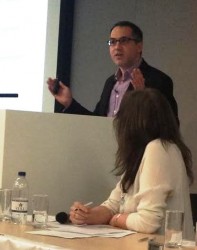BBC’s Mark Frankel on the latest social media trends
BBC News is a leading social media publisher and recently topped a list of the most shared content on Twitter in the UK.
Mark Frankel – assistant editor, social news at the BBC who manages the 8.9 million-followed @BBCBreaking Twitter handle, attributes the right mix of language, tone, speed and imagery used to the high uptake on social media.
In an exclusive interview with Cision, Mark discussed what’s new at BBC’s social sphere, listed the hottest social media trends and explained how PRs can better use the platform in communicating with journalists.

Mark Frankel at the news:rewired digital journalism conference last month.
What’s the latest on BBC’s social media domain?
The latest thing we’ve done in social media is the new Instagram channel that we started in November which was about developing bespoke content with 15-second videos. This channel is targeted at younger audiences that tends to consume short-form video. This channel was originally known as Ceefax, which was a text driven TV service that was decommissioned in October 2012, after 38 years. We decided to experiment with bringing it back as “Instafax” for Instagram. So these are 15 second videos with text wrapped around them.
We’ve also been developing how we tweet. We have a number of official BBC News Twitter accounts – programmes, brands and correspondents
We have also stepped up our presence on Facebook which is a more traditional social media platform with a renewed focus on being more innovative, visual and engaging.
What are the three most prominent social media trends?
The biggest, most important trend on social media is the increasing use of mobile as opposed to desktop. It is becoming important therefore to develop bespoke content which is responsive. A lot of media organisations have been quite slow on the uptake but this will become a big challenge in the months ahead as more and more people go to social media content via smartphones rather than desktop computers.
The second most important trend is Chat apps. We saw Facebook’s decision to purchase Whatsapp and that will be the beginning of a trend. Chat apps will become very dominant in the social media marketplace and other social platforms are playing catch-up to some extent – seeing how they can integrate some of what the Chat apps are doing into their platforms. Is it a question of buying them out? Is it a question of copying and aping some of the characteristics that they have?
Third, is about – in a sense, what the social media industry is doing to the traditional broadcast and media industry. Is it becoming more pertinent and relevant to the way people are consuming news via traditional media? And to what extent will it have an impact on the television and broadcast industry? Will continuous TV news become less important or more driven by social media? And how will the two of them work hand in hand? These are questions dictating the trends.
How does the BBC work with PRs?
We work closely with PR organisations from time to time to help us think through how we can engage more actively with our audience and make the most of our content. We have no advertising remit on our license-fee platforms but work with colleagues at BBC News Global on targeted campaigns, including sponsored tweets and other social media events.
What can PRs do better in working with the BBC?
A lot of it is understanding the difference between news and brand because BBC is both – a news organisation and a brand – but we’re primarily about our audiences and about what people want to see and consume on news terms. It’s very different when you’re marketing a consumer product – you’re looking at individual items and how they can be placed on different platforms. You’re looking at how to entice people into something. I think when you’re looking at a news organisation and the delivery of news, it’s a very different proposition. And I think sometime PR need to think of news with a different hat on.
Would you go forward or back in time?
I’d love to go back in time, which sounds like a contradiction because my work is looking to the future and new technology. But, I’m also a historian.
Who would play you in a film?
Matt Damon.
What super power would you have?
To travel back in time
If you weren’t a journalist, what would you choose to be?
I would be a teacher.
What is your weekend incomplete without?
Seeing my kids.

Leave a Comment